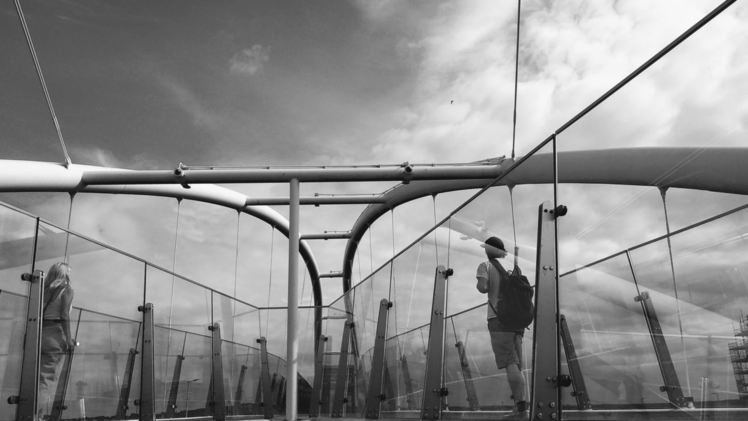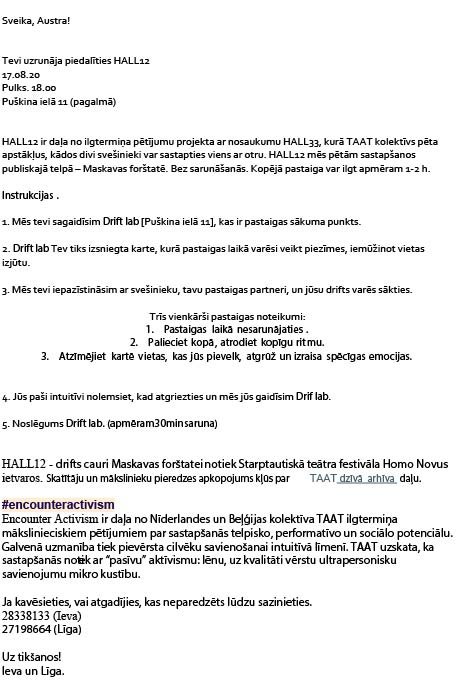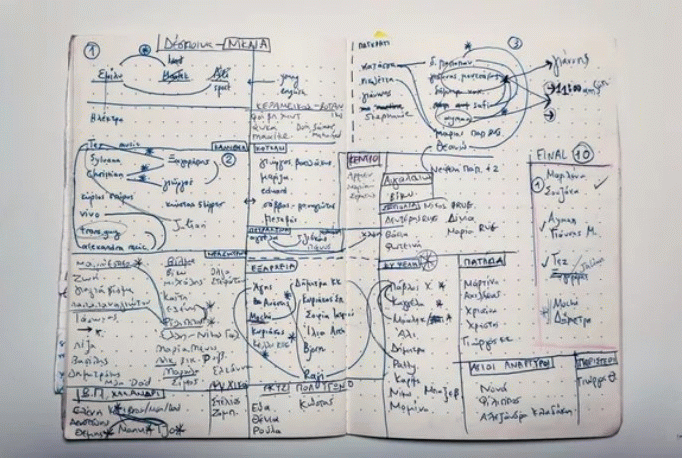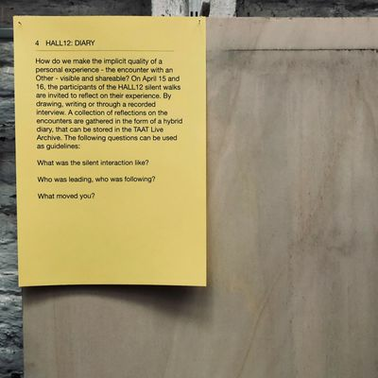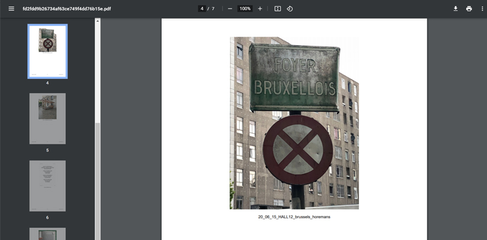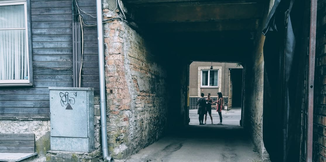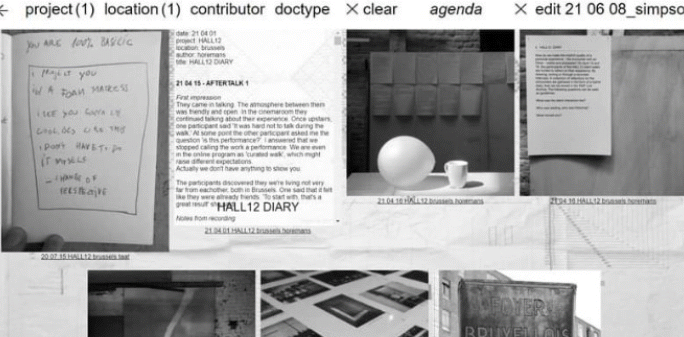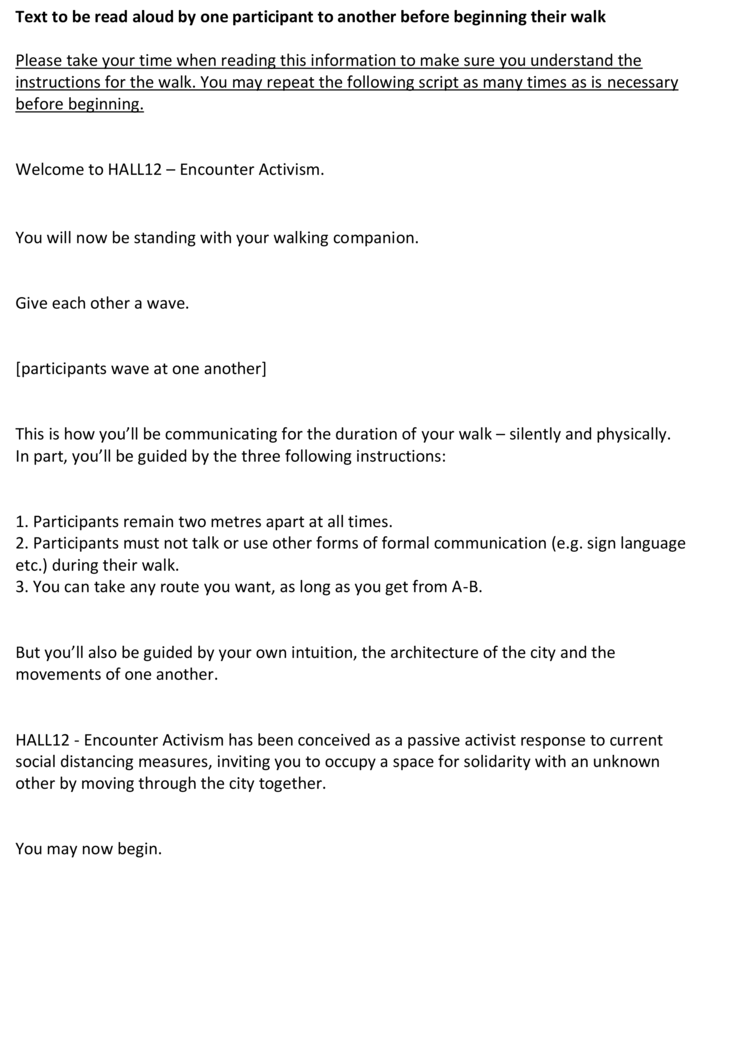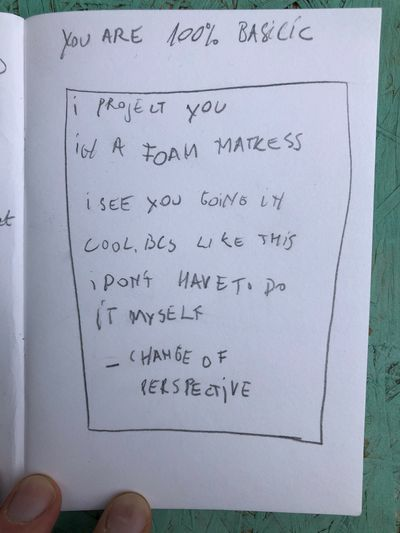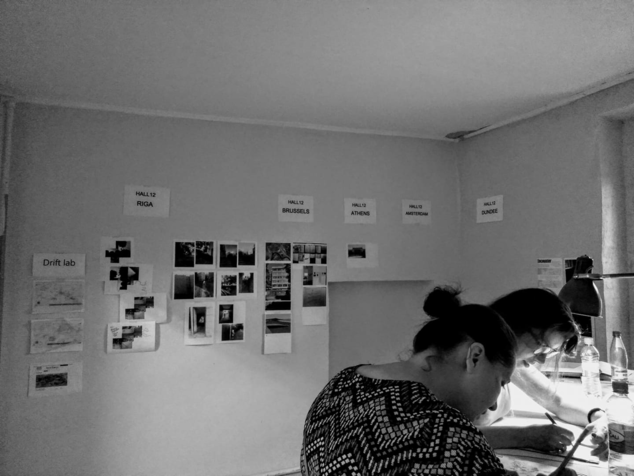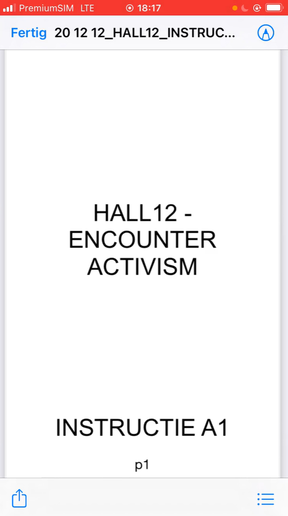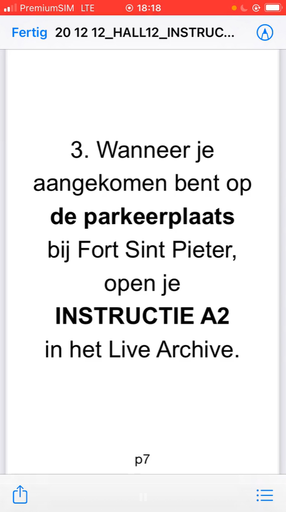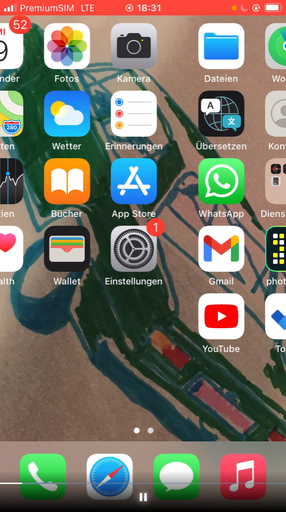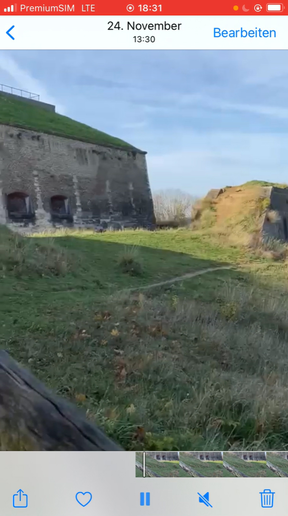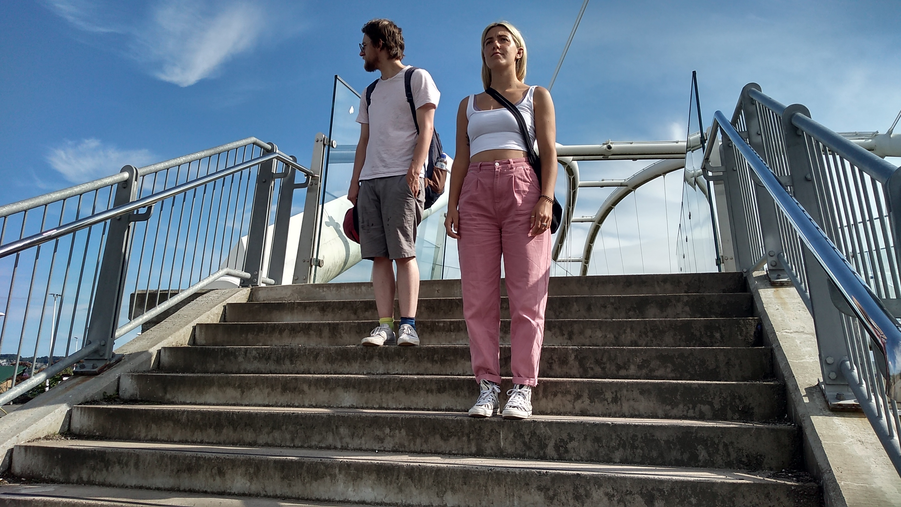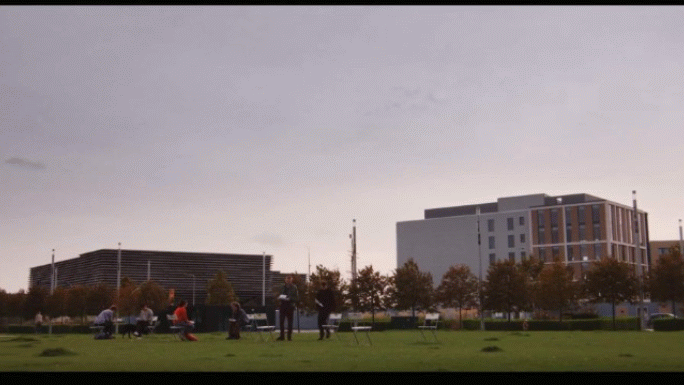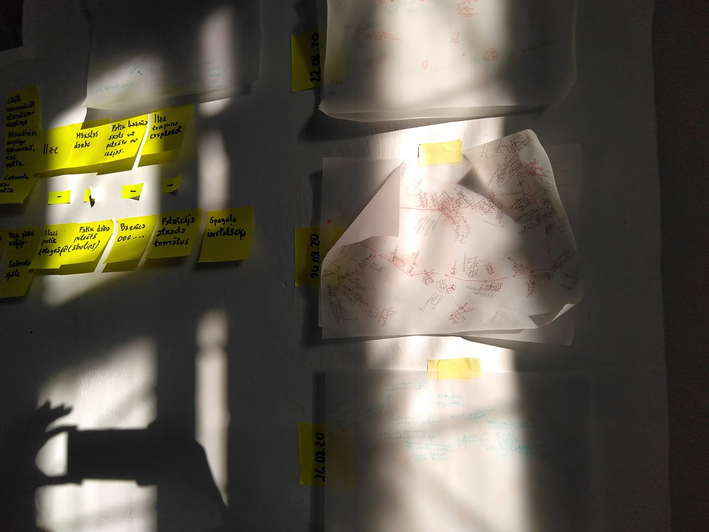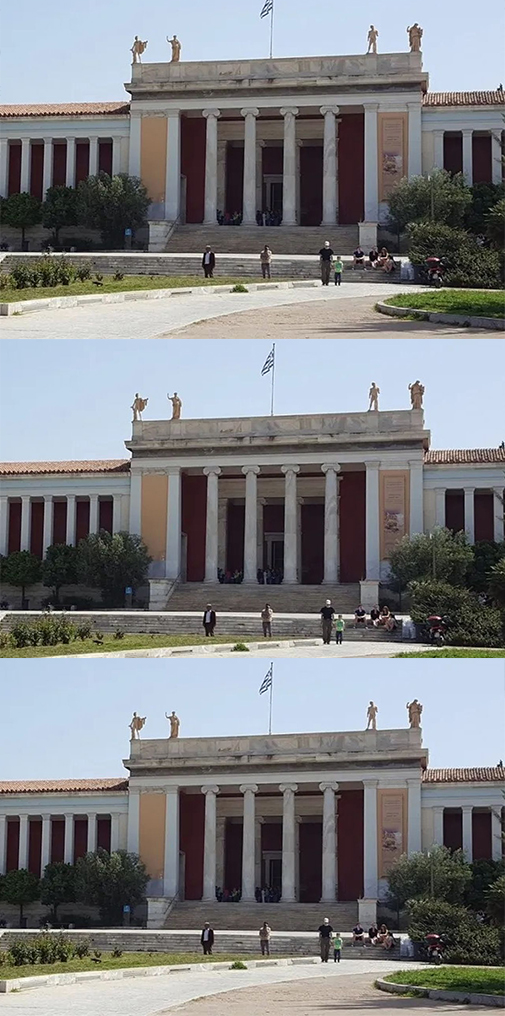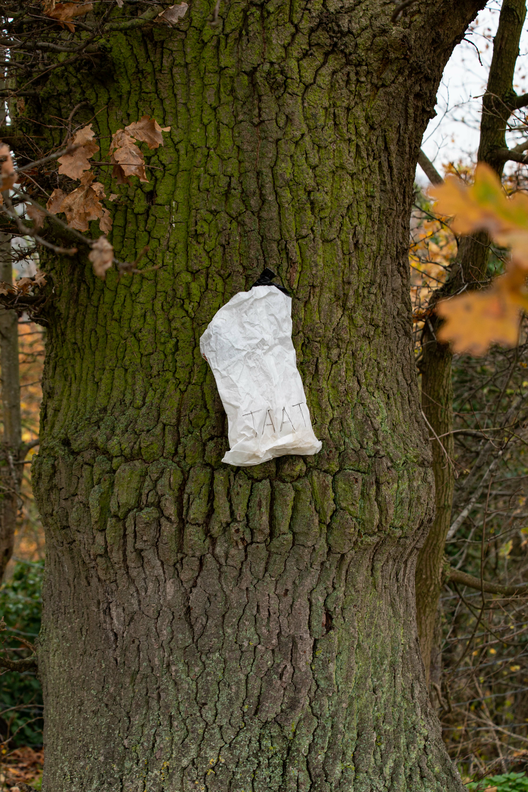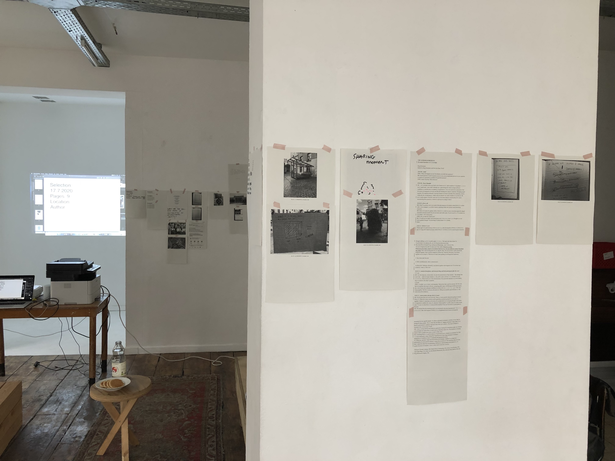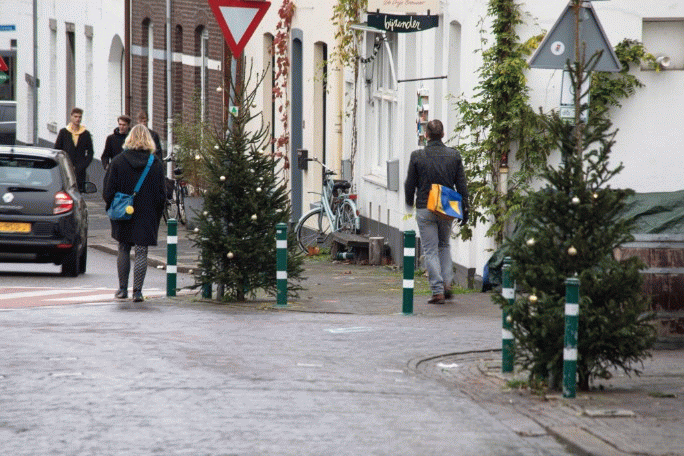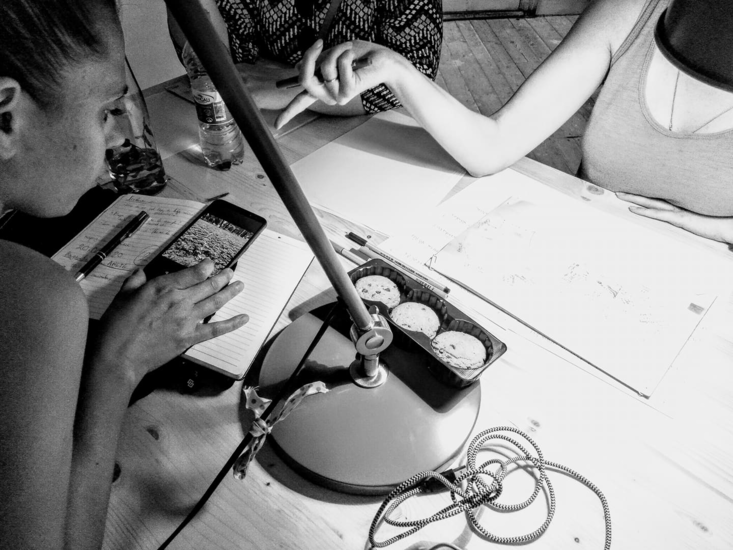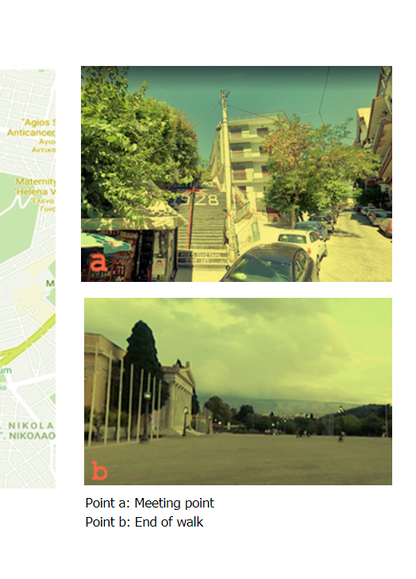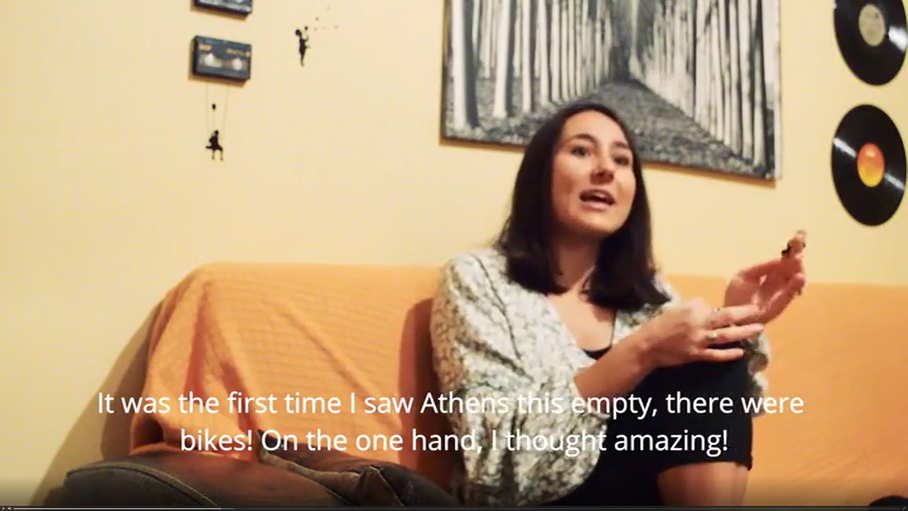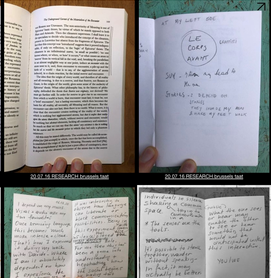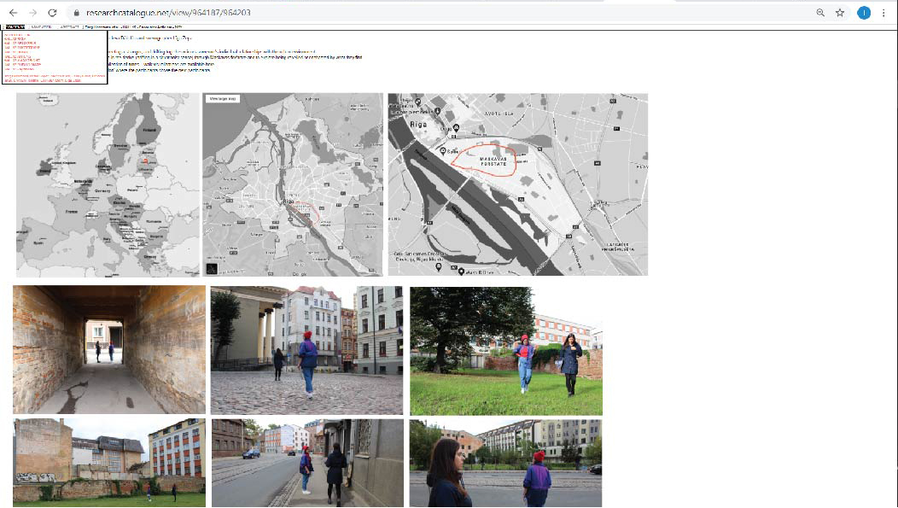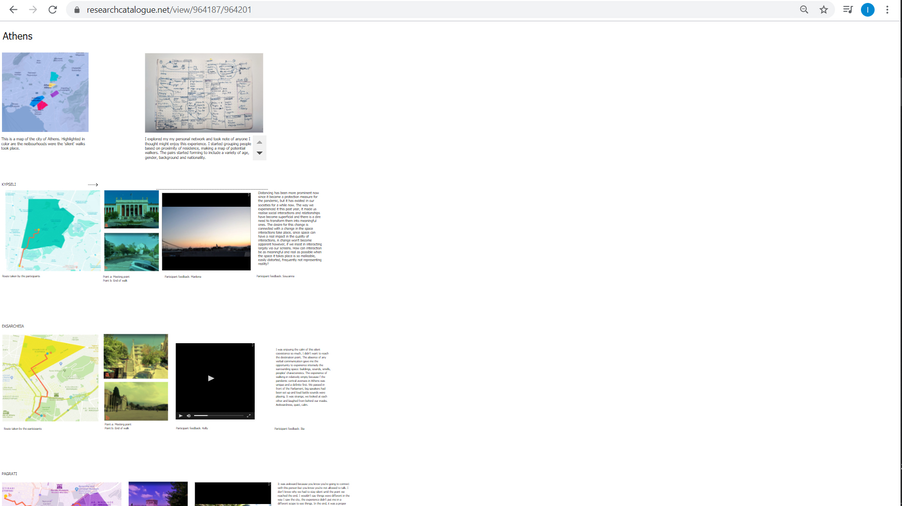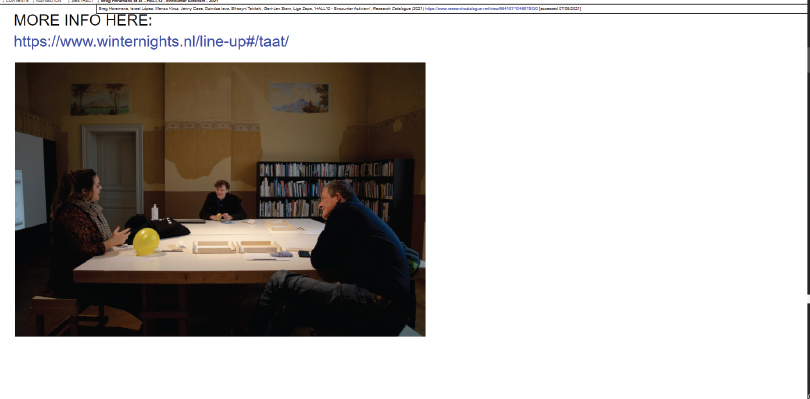The first phase was e-mailing
participants. Most of the e-mails were
very personal with an attempt
to connect throw out share content.
The dramaturgy was -
+ mailing
+ before introduction
+ coman introduction
+ after talk structure
Also space dramaturgy was involved .
Participants had to look throw the building
to see the other participant. One can say
it was a small greeting choreography at
the beginning of the walk.
After pre introduction, participants got a
little booklet for note during the walk with headline questions
- what you depend on?
- where you are?
During the walk participants could choose
when to stop and answer the question-what do I see through the eye of the other?
Dramaturgy starts with
communication with participants
weeks before the walk.
Then the idea of walks themselves
grow out of images of empty
theater auditoriums. Watching
theaters trying to find this balance
with audiences the design of two
chairs came in.
The dramaturgy of participants was that
everybody set off at the same time from
different parts of the city and walked
towards each other and end at
the same place.
For the concept a group of researchers
and artists was invited as audience members.
It was more targeted on exchange on
research field.
The concept was to see how one can
work with the instructions on the participant
mobile phone.
Both of the creators couldn't be in the city
physically so the format had a practical
side to it as well.
It was important to know how
dose it feel to walk alone, but at the same
time knowing you are walking together.
At end point people were received with
coffee and tea for the feedback session.
Also, they got a notebook with a series
of drawings and one question-
draw the root of you're encounter .
With tow color markers participants
had to draw their experiences. After
all that they received a QR code for
the research catalog where they could
later share their emotions from walk in
public diary.
We were exploring psycho-geography
and how meeting a stranger, and drifting
together mirrors someone’s individual
relationships with the urban environment.
Two strangers at a time were invited to
participate in the drift
(drifting in a situationist sense) through
Maskavas forštrate and to explore being
repelled or enchanted by what they find.
Participants took notes in our given maps.
The collection of notes visualizations
are available in Reasurche catalog.
Spectators were invited through a ‘domino-
selection’ where the participants chose
the next participants.
Tow strangers meet at a certain location
in the city of Amsterdam and experience
silent walk which don't have concrete shape,
but have several steps that they have to follow.
In the envelope there was also map which
showed how the participant had to place
them self in the meeting place .Also in the
envelope there was a smaller yellow envelope
which had to be open at the meeting point
with a balloon and a script.
The script was made in a way that people
could open it on the mobile phones.
Tow people met outside of Maastric and
from there they walked to a specific point
outside of the city.
The concept is a question -
how to create architectural dramaturgy
between tow strangers who
haven't met before?
Also context of the pandemic.
In general the idea was to stay as close as possible
to the primary TAAT concept of tow strangers
meeting and experiencing the space together.
This time it was neighbors who live very close
to each other but don't know each other in
the city of Athens.
The dramaturgy started on the hill. Each
one of the participants went on the separate
side of the hill and then there were tow
separate places where they would find a
little envelope with a balloon in it and next
instruction.
One participant sees from the distance the
other participants with the balloon and they
would start their walk.
(The balloon was used as a sign of recognition)
Artist delivered an envelope to participant
home .In the envelope there were tow things -
+ the general invitation
+ invitation to implement three movements
in the walk which challenge and synchronize
the movement.
(This wasn't a script, but a preparation
to get in the mood of moving)
In terms of the dramaturgy thy start
near their houses in their neighborhood, which
is point A and walk together to a
point B towards some of the public
space (parks, square). Public space
were chosen as destination because
it is a welcoming evairment for the after talk.
Invitation happened one week in advance.
Usually it was first a and second e-mail .
A very short time before the walk there
was a recheck on WhatsApp.
The creators chose just the first
tow participants and then every
participant invites the next person
who takes part in the walk.
Who are you inviting was influence
throw the communication channels
which we had - people who were
advertising the process (Creative Dunndy).
The target audience of Creative Dunddy is
people from art files which means
that most of the audience was
connected with art.
We created an advert that introduced the
project throw Creative Dunndy and
people could apply by e-mailing to
specially created account.
Throw the e-mails we had
series of instructions that inform
participants about the process.
.
This time we wanted a broader
network of audience members
so we asked collaborating institutions
to do a mapping around the institution
people. We were focusing on the farther
part of the network. When we find a
person we asked to find a less familiar
person to him or her. In this way we
made sure that the ecosystem got broader.
Most important is the fact that the invitation
went threw the others. At least tow weeks in
advance.
The invitation happened by, call or message
and after the candidate agreed on taking
part in the walk they received an e-mail
invitation with introductory information.
There was a process of exploring personal network and notes
where taken of anyone who might enjoy this experience.
Then people where groped based on proximity of residence
and then a map of potential walkers was made.
The pairs where formed to include a variety of age,
gender, background and nationality.
Participants were people from personal
network who were mixed with people
from invited institutions.
For the idea of finding each other
we wanted to capture the first glimpse
uncertainty. When you have to look
for the other.
Most important things for the walk was -
+ keep silent
+ keep together
+ seperate for the way back
+ to come back to the same starting
point was important
Maine instruction was given 2 weeks before
the walk, but artists gave their contacts in
case of confusement.
Instruction -
+ do it in silent
+ do the drift (there is no set root)
+ return to the start point throw any root
you feel
+ stop whenever you feel like it and
look through the eye of the other
The necessary instructions -
Meet your partners at necessary place
in the specific time.Then look for your partner ( looks were described in earlier email communication).
Wen participants met each other they
had to agree who will read out a short
piece of introduction text.
Where-
The start point is four locations in the Dunndy city center.
The endpoint is one common location- Slessor Gardens.
For the meeting day a time and a date
were organised and on the day
participants got a call to confirm
that they will be at the location.
Instructions were formulated every
time using the same emile and
just changing the dates,
names, visual descriptions.
The formulation of instructions where an
experiment. Instructions where double.
There was the writing instruction in website
and also audio reading of them parallel to the text.
It was possible to find the walk partner by
using the short visual description of the
other participant which where fond in the e-mail.
Participants found envelopes in which they could
find a balloon. One could find the parter by seeing
the balloon in the distance. The balloon was a playful
recognition sign for both participants.
There are three basic rules guiding your through this experience:
1. Stay silent until the end
2. Walk simultaneously, find a common pace
3. Explore the walking speed as your common language
At [.........], you decide together what happens next.
For the walk it self it wad the basic rules-
1. During the walk sty silent and don't talk
2.Stay together and find a common pase
The first thing was to communicate the fact that participants
had to go to their phones and find TAAT live archive page
where they would find the instructions.
PDF of instructions was made and then TAAT
recorded the instructions and comments about them.
This has become a guiding video of filmed TAAT archive page
which was mixed with video of the real location.
Instructions
What are the necessary instructions?
For the walk?
For finding each other, when/where/how?
How to formulate the instructions?
When/how to communicate them?
Invite a friend who could be open for the experience
After he or she agrees share their contact and we send
the official invitation
You don't have to formulate much of the information
because we will send the invitation letter with all the guidelines.
The communications have to be simple and precise,
so the participants don't get confused
Basic information is presented separately,
but the rules are presented for both of them together
1.During the walk sty silent and don't talk
2.Stay together and find a common base
3. Mark in the given map things you think
the other participant is thinking or feeling
It was very important
to explain how to get
to the live archive and
that you can only open
the videos at specific
points.
Always at the end
of instruction, we
would say -
when you are at
this point than
open the next
instruction.
It wasn't hard to relate to the participants
because the trust was created so
all of them felt very secure.
The process of the walk wasn't documented
because there was this idea of leaving
the participants in privacy.
In terms of recordings there was series
of opportunities to record -
+ in feedback space there was pens and paper for notes
+ also recording was the note book from the walk
Secure framework was created through the super personal
approach and the care we put in all the little things.
Trust frame is fixed when the participants are
greeted at the end of walks and have a
chance to share their experience.
+ there was this optional documentation.
After the walks participants could answer
some questions, but most of the filed
paper stayed with them.
Create a secure framework by creating
precise rules to follow
Guide the walk by intuition and no
verbal communication.
Relate to the other by absorbing
the other
The walk was documented by photos
and notes taken on the maps which
were given to the participants.
The last step was to gether the information
and put it in the Resurch catalog.
The only recording from the participants
at the end is the drawing on the experience.
Only side thing was the photos which were
taken from one of the walks.
One way of securing is to really make sure
that participant meets the other participant
and he or she don't feel abandoned.
Artist also have to be around in case of
something goes wrong.
The Silent Walk
How to create a secure framework ?
How to guide the walk?
How to relate to the participants?
How to record the walk?
For documentation video format was chosen.
The filming captured only the final moment
of the participant walk - reaching the Slessore
Gardens and finally sitting down for a
moment of conversation.
From the moment when people feel that
there is clear in the communication one
can feel that the framework is safe.
One can relate to the participants if
one test the walks. It helps
to imaginate situations.
Also, another significant point is that
one as a creature has taken part in
some of the previous HALL walks.
To create a secure framework one has to
build trust through communication.
This bond is more fixed in friendly
e-mails. Also the trust grows if one
is very precise in all the instruction details.
Welcoming environment-
+having someone there at the feedback space
(just in case)
+ofering coffee and tea
One can create safe and welcoming
situation by showing care.
And in Athne case the fact that
the creator personally knows the
participants definitely helped to
relate with them.
Acceuil
How to create a space in which the silence can be broken?
How to creat a situation that is safe and welcoming?
How to relate to the participants?
The place where the silence got broken had
to be very warm and welcoming -
like a a casual greeting talk.
From the feedback only 5 people out
of 10 agreed to be recorded. All 5 of
the recordings happened in very safe
spaces -
- one was at persons home
- one was in persons teras
- three more happened in the quieter side of the park
It was in the instructions to come in the final
location space and take your time.
There was coffee and tea and a mark that if
the participants feel like it they can do the
conversation.
The spacial set up was very carefully created.
The walls were covered with print outs from
other walks which gave the participants time
to sink everything in and get used to
the space.
The space reminded of an open research place.
There were tow spaces. In one there was this
projection of other HALL12 interviews and on
the other side of the wall there was this feedback
table with an artist who offered to record the
conversation and immediately open up the
result on the projection screen.
One creates a space where silence is broken
by drawing clear rules to every space.
Safe and welcoming space is created with free setting.
Starting with something as simple as a
cop of tee and cookies to enyo
during the conversation.
It is easier to relate to participants after you as
creator take some test walks.Then you know all
the feelings and situations better and it opens
up the conversation
The space where the silence can be broken
is created by framing the end part of the walk.
The information was already formulated in
the introduction letter.
2.Docomentation is some questions participant needs to
answer before starting the feedback session.
1.Describe your exsperience of the journey.
2.How did you negotiate the route with your partner?
3.Did your interaction with your partner develop or change
throughout the journey?How?
4.Did the walk alter your perception of town/city or prompt
you to see it in a different light?
5.What did you enjoy most about your experience?
6.What was your biggest discovery?
7.Describe your experience in 3 words.
8.What question would you like to ask your drift partner?
When one chooses the video format one need to answer some questions-
- How to do the video?
- What framing to chose?
- What filming Engels?
- What are the criteria for editing?
- What to do with the sound?
The video was the only one official documentation.
It was intentional decision not to document the walk
process so it stays a secret between the participants.
All feedback fixation is basted on taking notes.
Participants take notes during the walk and
we (authors) take notes during the feedback talk.
Fatback sheets were used together
the information .When participants
sent them in e-mail they also commented
the walk on phone conversation.
After the walk the participants received
the e-mail in which there were three
options how to give a feedback-
- throw video interview with the creator
- throw written response
- throw answering three of 10 given
questions about the walk
Feedback can be split in tow parts-
+during the walk (note book) +after the walk (recordings and drawings)
Gathering of the fatback happened with
the audio recorded interview, which were then
later transcripts and edited.
In the feedback part participants had
to make the drawings of the experience
and later they had the opportunity to leave
notes in research catalog as well.
In the test runs the wher experiments
with audio recordings, but eventually they
were too long to use.
Documentation
How to document the experience?
How to filter out the data?
How to make that documentation available for others?
Transform all the notes to digital format by,
scanning and photographing.
Filtration of data happened by taking out the
notes from the created maps and making a Drift poem.
The documentation becomes more available when
all the steps were uploaded in the Research Catalog.
Documentation-
- drawings of the participant
- written participant answers to feedback session question
- process pictures
- walk documentation pictures
The video format grows out of the image of a final
moment of the walk when arriving participants taking
seats one by one. It created a feeling that this
should be documented as a movement/action.
In this case the filtering out is the editing
of the video and for the there was some
key points to follow-
- it is necessary to see how time passes by
- capture how every pare arrives at endpoint
- fix how every pare leaves
- it is necessary to capture the body language
(video didnt record the conversation that way
this was important)
In this case the date filtration was video editing
and there was some criteria for that-
- to keep it short (under 3 min)
- to keep the text short (one paragraph long)
- to edit out not so mach the answers but to
stick with feelings and moments
+ Setup is the table and gathering the feedback
+ Talk would be the medium
+ Recording would be the recording by phone
+ Transcription throw artist lens to a public pad
which was open for others
There are tow levels for the data-
+first impression of the artist
(much more about artist interpretation of coming in)
+notes from recording (much more literal transcription)
Trying to be precise in choosing what to show
and what not.








